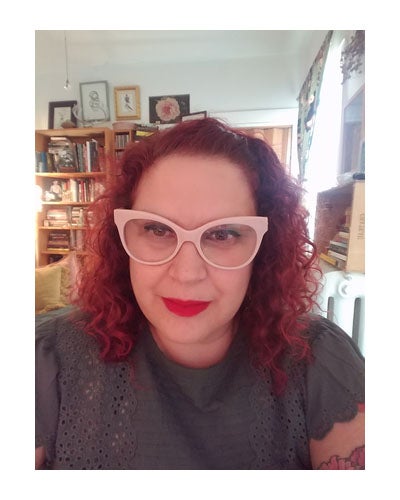Jennifer Rupert Wins Teaching Award
Introduction
It'll come as no surprise to her students that Senior Lecturer Jennifer Rupert is one of the 2020-21 winners of the Teaching Recognition Program (TRP) award. A campus-wide initiative, TRP recognizes teaching excellence for a minimum of three consecutive years. UIC English winners of this award in recent years include Margena Christian (2019-2020), Robin Gayle (2018-2019), Todd Sherfinski (2017-2018), and Aaron Krall (2016-2017). Undergraduate Studies Program Coordinator and Senior Lecturer Kate Boulay caught up with Dr. Rupert to ask about her motivation for teaching and challenges she's faced during her time in the classroom. (This interview was originally posted in the Director of Undergraduate Studies Office's "Major News!" newsletter on January 7, 2021.)
Interview

What made you want to be an English teacher?
I am a self-described “lover of stories” and grew up with a father who is still one of the best storytellers I know. I made the decision to go to college last minute and declared a major in Business in order to be “practical.” I had an amazing first year writing instructor in my first semester and she wondered why I wasn’t majoring in what I loved to do which was reading and writing. I switched my major from Economics to English in my second semester. After taking more literature courses, I knew that I wanted to be an English professor as improbable as that sounded to me as a first-generation college student from a working-class background. I also noticed that there were very few women on the faculty in the English department. Although I hadn’t been planning on a university education, my parents had impressed upon me and my sister from a young age that we should pursue professions that allowed us to do meaningful work. As a 19-year old I couldn’t imagine anything more meaningful than sharing that spark I experienced for the very first time in a college classroom.
When I talk to students today about my decision to pursue becoming an English professor, another very significant part of my story includes the detail that there wasn’t a gender studies program at my undergraduate institution. I often describe my undergraduate self as a “one woman gender studies department.” It wasn’t until I went to graduate school that I realized that there was a name for the kind of scholarship I had been doing from the very beginning.
What is your favorite thing about teaching UIC students?
One of the many reasons I enjoy teaching UIC students is that they are far more worldly than I was at their age. I grew up in a small place in rural Pennsylvania and dreamed of moving away and traveling. Our students’ families come from all over the world and speak more than fifty different languages. It is not an exaggeration to say that my world got a lot bigger when I came to UIC as a graduate student and began teaching the subjects I love—writing, literature, and gender & sexuality studies—to this incredibly diverse audience. I relate strongly to many of the challenges our students face as they aim to juggle school, work, and family responsibilities. I continue to be in awe of our students’ grit and determination to excel in their studies as they take on even more than I was made to at their age.
What is one of the greatest challenges you had to overcome in the classroom?
As a beginning teacher, I definitely suffered from a lack of confidence. So much so, that early in my career, more than one student commented on it—not unkindly— in their end-of-the-term evaluations. Over the years, I have become much more comfortable with thinking about the teaching I do as deeply collaborative. Of course, I select the materials for the courses I teach, but I don’t attempt to demonstrate ‘mastery’ of every—or any— text I choose. Rather, I approach teaching as sharing knowledge, excitement, curiosity!!! At this point in my teaching career, I am much more comfortable with the fact that my students know more than I do about some things and that we are coming together to share information and learn from one another. Together, we seek to know more than we did when we first met.
If you could invent a new class/topic, what would it be?
Hmmm. That’s a tough one. I will say this: after teaching a very popular course in critical media studies for the Honors College general education curriculum for several years, I have come to understand how interdisciplinary my teaching (and research) interests are. I was trained as a feminist literary critic with a very particular literary time period and set of texts as my areas of expertise. Nowadays, I understand more than ever how much my thinking and teaching owe to many different disciplines, including philosophy, history, sociology, psychology, media studies, queer studies, and intersectional feminist and critical race studies. I have recently designed a first-year writing course based on my deep interest in the intersections of popular culture and politics. And I am poised to pitch another general education course to the Honors College on (mis)representations of feminism in popular culture & pop-feminism.
What advice would you give to students who want to become English teachers or professors?
Teaching English at every level of education must be a labor of love. There was something special that happened to me when I found myself in a college-level literature class that had never happened to me in my previous education. I couldn’t wait to do my homework. I would buy books at the university bookstore for classes I wasn’t even taking. I wanted to talk about what I was reading with anyone who would listen. For the first time, I had an appetite for learning that I didn’t have before. To be a good teacher is to keep that enthusiasm alive and to look forward to sharing it and igniting it in others.